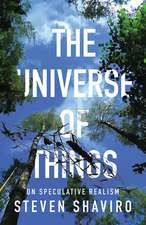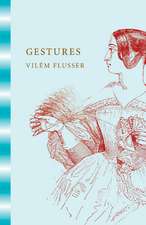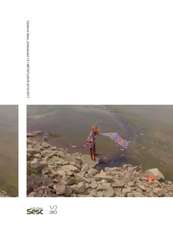Vampyroteuthis Infernalis: A Treatise, with a Report by the Institut Scientifique de Recherche Paranaturaliste: Posthumanities, cartea 23
Autor Vilém Flusser, Louis Bec Traducere de Valentine A. Pakisen Limba Engleză Paperback – 6 sep 2012
How far apart are humans from animals—even the “vampire squid from hell”? Playing the scientist/philosopher/provocateur, Vilém Flusser uses this question as a springboard to dive into a literal and a philosophical ocean. “The abyss that separates us” from the vampire squid (or vampire octopus, perhaps, since Vampyroteuthis infernalis inhabits its own phylogenetic order somewhere between the two) “is incomparably smaller than that which separates us from extraterrestrial life, as imagined in science fiction and sought by astrobiologists,” Flusser notes at the outset of the expedition.
Part scientific treatise, part spoof, part philosophical discourse, part fable, Vampyroteuthis Infernalis gives its author ample room to ruminate on human—and nonhuman—life. Considering the human condition along with the vampire squid/octopus condition seems appropriate because “we are both products of an absurd coincidence . . . we are poorly programmed beings full of defects,” Flusser writes. Among other things, “we are both banished from much of life’s domain: it into the abyss, we onto the surfaces of the continents. We have both lost our original home, the beach, and we both live in constrained conditions.”
Thinking afresh about the life of an “other”—as different from ourselves as the vampire squid/octopus—complicates the linkages between animality and embodiment. Odd, and strangely compelling, Vampyroteuthis Infernalis offers up a unique posthumanist philosophical understanding of phenomenology and opens the way for a non-philosophy of life.
Part scientific treatise, part spoof, part philosophical discourse, part fable, Vampyroteuthis Infernalis gives its author ample room to ruminate on human—and nonhuman—life. Considering the human condition along with the vampire squid/octopus condition seems appropriate because “we are both products of an absurd coincidence . . . we are poorly programmed beings full of defects,” Flusser writes. Among other things, “we are both banished from much of life’s domain: it into the abyss, we onto the surfaces of the continents. We have both lost our original home, the beach, and we both live in constrained conditions.”
Thinking afresh about the life of an “other”—as different from ourselves as the vampire squid/octopus—complicates the linkages between animality and embodiment. Odd, and strangely compelling, Vampyroteuthis Infernalis offers up a unique posthumanist philosophical understanding of phenomenology and opens the way for a non-philosophy of life.
Din seria Posthumanities
-
 Preț: 220.24 lei
Preț: 220.24 lei -
 Preț: 188.33 lei
Preț: 188.33 lei -
 Preț: 162.02 lei
Preț: 162.02 lei -
 Preț: 123.92 lei
Preț: 123.92 lei -
 Preț: 132.16 lei
Preț: 132.16 lei -
 Preț: 170.61 lei
Preț: 170.61 lei -
 Preț: 215.67 lei
Preț: 215.67 lei -
 Preț: 112.18 lei
Preț: 112.18 lei -
 Preț: 171.91 lei
Preț: 171.91 lei -
 Preț: 185.87 lei
Preț: 185.87 lei -
 Preț: 185.21 lei
Preț: 185.21 lei -
 Preț: 169.30 lei
Preț: 169.30 lei -
 Preț: 107.72 lei
Preț: 107.72 lei -
 Preț: 146.17 lei
Preț: 146.17 lei -
 Preț: 154.57 lei
Preț: 154.57 lei -
 Preț: 178.55 lei
Preț: 178.55 lei -
 Preț: 111.14 lei
Preț: 111.14 lei -
 Preț: 214.29 lei
Preț: 214.29 lei -
 Preț: 155.48 lei
Preț: 155.48 lei -
 Preț: 169.70 lei
Preț: 169.70 lei -
 Preț: 153.60 lei
Preț: 153.60 lei -
 Preț: 186.23 lei
Preț: 186.23 lei -
 Preț: 179.48 lei
Preț: 179.48 lei -
 Preț: 187.41 lei
Preț: 187.41 lei -
 Preț: 304.84 lei
Preț: 304.84 lei -
 Preț: 120.18 lei
Preț: 120.18 lei -
 Preț: 242.71 lei
Preț: 242.71 lei -
 Preț: 187.73 lei
Preț: 187.73 lei -
 Preț: 138.99 lei
Preț: 138.99 lei -
 Preț: 185.76 lei
Preț: 185.76 lei -
 Preț: 216.24 lei
Preț: 216.24 lei -
 Preț: 224.90 lei
Preț: 224.90 lei -
 Preț: 218.74 lei
Preț: 218.74 lei -
 Preț: 223.55 lei
Preț: 223.55 lei -
 Preț: 222.01 lei
Preț: 222.01 lei -
 Preț: 198.89 lei
Preț: 198.89 lei -
 Preț: 222.18 lei
Preț: 222.18 lei -
 Preț: 209.96 lei
Preț: 209.96 lei -
 Preț: 178.37 lei
Preț: 178.37 lei -
 Preț: 234.86 lei
Preț: 234.86 lei -
 Preț: 204.11 lei
Preț: 204.11 lei -
 Preț: 208.36 lei
Preț: 208.36 lei -
 Preț: 223.55 lei
Preț: 223.55 lei -
 Preț: 230.95 lei
Preț: 230.95 lei -
 Preț: 170.98 lei
Preț: 170.98 lei - 19%
 Preț: 99.50 lei
Preț: 99.50 lei
Preț: 145.56 lei
Nou
Puncte Express: 218
Preț estimativ în valută:
27.86€ • 28.98$ • 22.100£
27.86€ • 28.98$ • 22.100£
Carte disponibilă
Livrare economică 24 martie-07 aprilie
Livrare express 07-13 martie pentru 16.54 lei
Preluare comenzi: 021 569.72.76
Specificații
ISBN-13: 9780816678228
ISBN-10: 0816678227
Pagini: 112
Ilustrații: 16
Dimensiuni: 152 x 229 x 20 mm
Greutate: 0.16 kg
Ediția:1
Editura: University of Minnesota Press
Colecția Univ Of Minnesota Press
Seria Posthumanities
ISBN-10: 0816678227
Pagini: 112
Ilustrații: 16
Dimensiuni: 152 x 229 x 20 mm
Greutate: 0.16 kg
Ediția:1
Editura: University of Minnesota Press
Colecția Univ Of Minnesota Press
Seria Posthumanities
Notă biografică
Vilém Flusser (1920–1991) was born in Prague; emigrated to Brazil, where he taught philosophy and wrote a daily newspaper column; and later moved to France. Among his many books that have been translated into English are Does Writing Have a Future?, Into the Universe of Technical Images, and Writings, all from Minnesota.
Louis Bec is an artist who lives and works in Sorgues, France. He is the founder of the Institut Scientifique de Recherche Paranaturaliste.
Louis Bec is an artist who lives and works in Sorgues, France. He is the founder of the Institut Scientifique de Recherche Paranaturaliste.
Cuprins
Contents
The Treatise
I. Octopoda
II. Genealogy
The Phylum Mollusca
The Class Cephalopoda
The Species Vampyroteuthis infernalis giovanni
III. The Vampyroteuthic World
Its Model
The Abyss
Vampyroteuthic Dasein
IV. Vampyroteuthic Culture
Its Thinking
Its Social Life
Its Art
V. Its Emergence
Report by the Institut Scientifique de Recherche Paranaturaliste
Recenzii
"A classic available in English at last, this collaboration between Vilém Flusser and Louis Bec is a pioneering exploration of uncharted territory in the realm of animal cognition, philosophy and art. At once inquisitive and whimsical, this unclassifiable book brings together some of the best work of two cutting-edge thinkers that were not only geographic but also intellectual neighbors." —Eduardo Kac
"Vampryoteuthis Infernalis is a unique work that is at once literary and philosophical, poetic and scientific, and it nicely combines the imaginative fancy of the beast fable with elements of science fiction and horror. Flusser’s work is a hybrid creature, a marvelous and monstrous text that mirrors the fantastical creature it describes. The Vampyroteuthis holds a wonderfully strange and unhuman mirror up to the human and in so doing opens the way for a strange and novel non-philosophy of life." —Eugene Thacker, author of After Life











